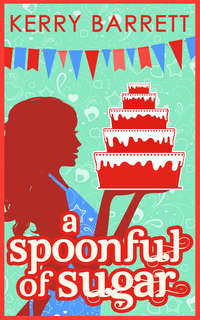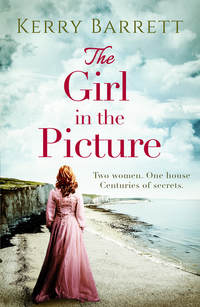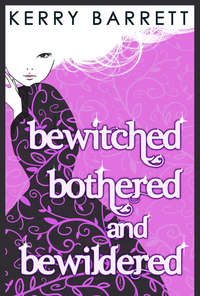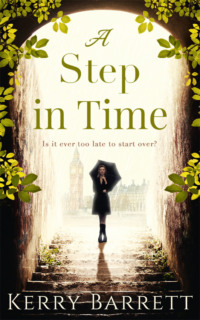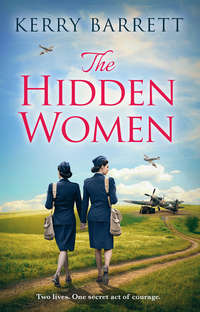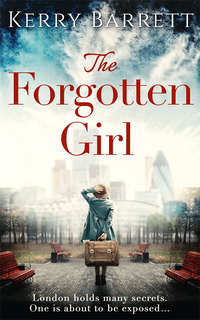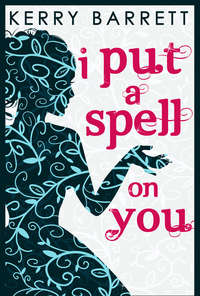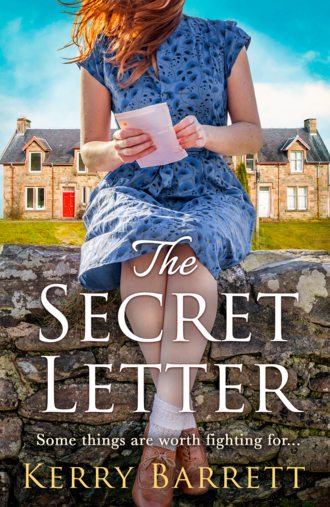
Полная версия
The Secret Letter
I screwed up my face. ‘Sorry, I don’t know who that is.’
‘She founded Elm Heath Primary back in the early twentieth century,’ Paula said, as though she was reading from an information card at a museum. ‘We’re actually one of the oldest schools in the county. Esther Watkins dedicated her life …’
‘Maybe we should move her picture,’ I said hurriedly, interrupting her before I got treated to a lecture about a sour-faced spinster who probably thought children should be seen and not heard.
Paula looked horrified so I backtracked immediately.
‘I mean, maybe she needs to be seen. We could put her in the main office, perhaps. Or in the corridor.’
‘Perhaps.’ Paula sounded doubtful. ‘I’ve always thought it was nice that she’s in here. This would have been her office at one time, you know?’
I knew when I was beaten. I’d move grumpy Ms Watkins when I was settled in and had a quiet moment to myself.
‘I’ll see you tomorrow then,’ I said to Paula.
She grinned at me, obviously pleased she’d convinced me to leave Esther Watkins where she was.
‘I’ll send someone round to get you about sixish.’
‘Sounds great,’ I said, forcing away the nerves I was feeling at being “presented” to all the staff at once. ‘Lovely.’
Chapter 3
Lizzie
What did one wear to a village barbecue? I wondered, looking at my small selection of clothes later. When my life had fallen apart, I’d put most of my belongings into storage while I holed up at my mum’s house. And then, when I’d moved down to Elm Heath in the middle of deepest, darkest Kent, I’d realised I didn’t need all the stuff I’d accumulated over the years – it just reminded me of better times – so I sold it all, except for a few boxes of books.
Now I had what might be called a capsule wardrobe. A very small capsule wardrobe. I decided to go casual, so I pulled on the pair of cropped jeans I’d been wearing at school yesterday and a floaty vest with little flowers on it, and put a cardigan in my bag in case it got chilly later.
I was, I discovered when I was trying to draw a straight line with eyeliner, ridiculously and shakily nervous. What if everyone knew what had happened in London and they all thought I’d been involved? What if none of them wanted to work with me? What if – I gasped aloud and jabbed myself in the eye with the eyeliner pencil – they’d all wanted Paula to be the new head and were resentful that I’d got the job?
With one eye watering, I wiped off the mess I’d made of my make-up and instead just dabbed on some lip balm. They’d have to take me as I was. I brushed my hair, then went downstairs to my tiny kitchen and took the bottle of Prosecco I’d bought out of the fridge. If all else failed, I’d bribe them with bubbles.
I was ready and waiting when the doorbell rang, but it still made me jump because I was so edgy. I took a deep breath, plastered a smile on my face and opened the door to find a woman maybe five years younger than me on the doorstep. She had bright blonde hair in a high ponytail and freckles and looked like a cheerleader in an American teen film.
‘Hello, I’m Lizzie,’ I said, then I paused. ‘Lizzie Armstrong.’
She grinned at me, showing neat, white teeth. ‘I’d worry if you weren’t,’ she said. ‘Paula sent me to fetch you. I’m Pippa Davis. I teach years one and two.’
I relaxed, slightly, in the face of such friendliness. ‘Nice to meet you Pippa,’ I said. I picked up my bag and the bottle. ‘Shall we go?’
Paula was right, she did live just round the corner. I wondered if it was going to be odd living on top of all my colleagues and – more importantly – my pupils. Though we’d lived fairly close to our school in London, catchment areas were so small we didn’t have students as neighbours. This was going to be totally different.
‘Everyone’s so excited to meet you,’ Pippa said as she bounced down the side of Paula’s large detached house – I remembered what she’d said about her husband having clients and wondered briefly what he did – and into the big garden, me trailing behind like a sulky teenager.
‘She’s here!’ she sang. ‘Lizzie’s here!’
The garden was full of people, chatting and laughing, but as Pippa made her announcement, they all fell silent and as one they turned and stared at me. I felt sick. I’d not wanted to arrive with a huge fanfare, like this.
‘Hello,’ I squeaked. ‘Hi.’
Everyone chorused hellos and Paula rushed up to us and gave me a hug that surprised me.
‘So pleased you could make it,’ she said. ‘Come and meet everyone. Pippa, can you get Lizzie a drink?’
My head spinning, I took the glass Pippa handed me and drained it without even looking at the contents.
‘So, Pippa you’ve met,’ Paula said. ‘And her best friend is Emma, who’s our school secretary. She keeps us all organised. They both went to Elm Heath Primary together – isn’t that lovely?’
‘Lovely,’ I echoed.
I could hear Grant’s mocking voice in my head. He’d roll his eyes at the thought of people growing up here, marrying their childhood sweetheart, and staying put. ‘It’s so English,’ he’d say with a sort of superior chuckle. ‘So white, straight … vanilla.’
I thought of Broadway Common School where we had kids speaking more than thirty languages, celebrated every festival going, worked hard to include the kids with two dads in Mother’s Day and the ones with two mums in Father’s Day, and I wondered if I’d miss that diversity.
‘This is Nate – Mr Welsh – who teaches years five and six,’ she said introducing a man about the same age as Pippa and Emma, who’d no doubt gone to school with them too.
I shook his hand. ‘Pleased to meet you,’ I said.
Nate stifled a yawn. ‘God, I’m sorry,’ he said in horror. ‘That was so rude.’
Paula looked at him with genuine affection. ‘Nate’s a new dad,’ she said.
‘Congratulations.’ I smiled at him. ‘Is your wife here?’
Nate looked at me with a hint of mischief in his eyes. ‘My husband Marc is over there with our baby, Leia,’ he said.
I turned to see an athletic man, a bit older than Nate, expertly bouncing a baby on his knee, while holding a bottle of beer and chatting to another man.
I screwed my face up. ‘Sorry,’ I whispered, feeling a tiny flush of triumph. Ha, Grant! I thought. Village life is interesting.
Nate chuckled. ‘Don’t be. It must be hard for you coming from London where people aren’t as liberal.’
He was joking, I thought. But I blushed anyway.
Nate introduced me to another teacher – Celeste – who was a dead ringer for a young Michelle Obama, right down to the enviable upper arms. I slid my own bingo wings into my cardie as I spoke to her, feeling self-conscious and not just about letting myself believe that everyone in Elm Heath was a boring stereotype.
Paula’s husband Chris was on the barbecue and their daughter Chloe, who was in sixth form, handed out drinks. It was all very pleasant, just a bit – overwhelming. Trying to make a good impression on so many new people was hard work.
Needing a moment to myself, I slunk across the garden to an empty deckchair and sat down. To my left, Paula’s husband Chris was flipping burgers. He was engaged in what seemed to me to be a fairly heated discussion with the man who’d been talking to Nate’s handsome husband. The other man was shorter, stockier, and more dishevelled than Marc, but also very attractive in his own way.
Both Chris and the other man looked quite cross and I was intrigued. I leaned slightly to the side and tried to eavesdrop on their conversation.
‘I think you’re being unrealistic,’ Chris was saying. ‘Idealistic.’
The other man frowned. He looked worried. ‘I thought perhaps, I could just see it as business …’
‘Are you the new headmistress?’ a voice at my elbow said, interrupting my earwigging. I turned to see a small girl – year three, I guessed with my expert eye – with a gap-toothed smile and wonky bunches.
‘I am,’ I said.
She fixed me with a serious stare. ‘Are you a nice headmistress or a strict headmistress?’
I thought about it. ‘Could I be both?’
‘S’pose.’
‘Then I will be both.’
‘You don’t look like a headmistress.’
‘Why not?’
‘You look like a mummy.’
I smiled, a genuine, not-nervous smile. ‘Do I look like your mummy?’
‘My mummy is dead.’
I stopped smiling. ‘I’m sorry.’
The little girl grinned at me. ‘I have a daddy.’
‘That’s nice.’
I shifted awkwardly in my seat. Obviously, I considered myself to be good with kids, but I was off my game this evening and this small child was unsettling me.
‘What is your name?’ she asked.
‘Ms Armstrong. What’s yours?’
‘Cara,’ she said, frowning. ‘What is Mizzzzzzz?’
‘It’s a title, like Mrs or Miss.’
Cara shook her head, her lopsided bunches bouncing. ‘I think you’re getting muddled,’ she said kindly, patting my hand. ‘Miss means you haven’t got a husband or a wife, and Mrs means you have. Mizzzzzz is just pretend. Do you have a husband or a wife?’
I swallowed. ‘No, I don’t have a husband.’
‘Do you have a wife?’
‘No.’
She nodded. ‘Then you are a Miss,’ she said, speaking clearly like I was elderly and hard of hearing. ‘MISS.’
‘Cara, are you being a nuisance?’
The attractive man who’d been talking to Chris was standing in front of us. He flashed me a smile and for a split second I felt a flicker of interest and not just in his conversation. He was wearing a rumpled T-shirt and jeans and his hair was sticking up, but there was something about him that I liked.
‘I’m chatting to MISS Armstrong,’ Cara said. ‘She is the new headmistress and she is nice and also strict and she doesn’t have a husband or a wife.’
I felt myself flush as the man raised an eyebrow at me. ‘Strict, eh?’
Urgh. ‘I have my moments,’ I said. Where on earth did that come from? Was I flirting?
The man put his hand on Cara’s head. ‘We need to go, angel,’ he said. ‘It’s late.’
‘But Daddy, it’s a party.’
‘And now it’s finished.’
Cara rolled her eyes and I couldn’t help but chuckle.
‘Nice to meet you, MISS Armstrong,’ the man said. ‘I’m Danny Kinsella, by the way.’
‘Are you a teacher?’ I said, running through the list of names Pippa had bombarded me with in my head.
‘God no. Just a friend of Paula and Chris.’
‘And a daddy,’ Cara said.
He smiled down at her. ‘And a daddy.’
‘See you at school then, Miss Armstrong.’
He waved at me, and he and Cara wandered off down the side of the house and out on to the road. I stared after them feeling slightly off-balance. There was definitely more to life in Elm Heath than I’d imagined.
Chapter 4
Lizzie
I was at school at the crack of dawn on the first day of term. I had always been an early riser, and when I was nervous I could never sleep.
I thought I’d be the only person there, but Emma was already in the office.
‘Morning,’ she sang. ‘Ready for action?’
I grimaced. ‘As I’ll ever be.’
She put a hand on my arm. ‘You’ll be great. Cup of tea?’
‘Yes please.’
Emma headed to the corner of the reception area where there was a sink, a little fridge and a kettle and busied herself finding mugs.
‘I’ll let you get on,’ she said over her shoulder as she filled the kettle. ‘Some things arrived for you. I’ve put them all on your desk.’
I thanked her and headed into my office. I’d come in every day for a couple of hours and made it more homely. I’d put books on the shelves, and brought in my stationery. But Esther Watkins still glowered down at me and the whole room was still pretty bare. At least it had been. Now there was a stack of post on my desk, a huge bouquet of flowers, a box of chocolates and two bottles in shiny presentation bags.
‘Oh my God,’ I breathed. ‘What’s all this?’
Emma had come up behind me, holding my tea. ‘Everyone’s very pleased you’re here,’ she said. ‘The big card and the chocolates are from the staff, but I think all the other bits are from parents.’
She handed me the mug. ‘I’m going to go and check all the classrooms,’ she said. ‘See you in a little while.’
Overwhelmed, again, I sat down on the chair and stared at the pile of gifts. I couldn’t believe how welcoming everyone was being. It was not what I’d expected and I almost felt guilty that they were being so nice when I was seeing this job as a step on my road back to normal life. A means to an end, rather than an end in itself.
I took a deep breath and a swig of tea and started opening the cards. They were all full of lovely good luck messages.
‘Wishing you and Elm Heath Primary lots of luck for the future,’ one said. ‘Love Sarah, Gary, Olivia (y6) and Rosie (y4).’
‘Let’s hope this is an exciting new chapter for Elm Heath Primary,’ read another. While another said, in a child’s handwriting: ‘Hello Mrs Armstrong! From William, Luke, Charlie and Emily.’ The kids had all signed their names individually and drawn little pictures of themselves and it was so adorable I could forgive them calling me “Mrs Armstrong”.
There was even one from Danny and Cara Kinsella. ‘Good luck, MISS Armstrong,’ Danny had written, which made me smile even while I prickled with irritation. ‘See you soon.’
I arranged the cards on the shelves, put the wine to one side to keep for drinks with the staff on Friday – I thought we’d probably need them – and opened the big card from the staff.
They’d all written personal messages to me, telling me how much they were looking forward to working with me, and how they thought this was the start of good times for Elm Heath Primary. I felt guilty all over again as I read them, given that I was approaching this job as a sort of gap year. A sabbatical. A way of pressing the reset button after a blip in an otherwise high-flying teaching career, no matter how many sweet pictures the kids drew, or how many messages of support the staff shared.
‘Don’t look at me like that,’ I said to Esther Watkins as she stared down at me.
I drained my mug of tea and turned my attention to the flowers. They were peonies – my absolute favourite and very hard to come by in early September.
With a slight sense of misgiving, I pulled out the envelope that was tucked inside the cellophane wrapping and slid my finger under the flap to open it.
‘Queenie,’ the card read. I winced at the stupid nickname that I’d not heard in a long while. ‘Missing you fiercely but wishing you lots of luck. Gx’
My stomach twisted. How could he do this? I was just getting to the point where I didn’t think about him every hour of every day and now he’d wormed his way in again.
‘Sod off, Grant,’ I said out loud. I screwed up the card and threw it in the bin, then reached in and took it out again.
It had been such a shock when I’d discovered the extent Grant had gone to in his career. The risks he’d taken and the questionable practices he’d employed and not even for the good of the kids, simply to make himself look better – for his own gains. I’d been shocked by his deception, and by the fact that he’d not been the person I’d thought he was.
And then I’d been shocked all over again at how easily he’d sacrificed our marriage. His only concern was looking after himself; I didn’t seem to count for anything. It had been a long, hard year for me, living with Mum, coming to terms with what had happened, applying for jobs and having to explain why I’d left London over and over again. But it looked like Grant didn’t appreciate that at all.
‘Sod. Off,’ I said again. This time I ripped the card up into tiny pieces, shredding it on my desk like ironic confetti.
A knock on my door made me jump and I swept the bits into the bin, just as Paula stuck her head round.
‘Morning! The kids are about to arrive,’ she said. ‘Thought you might like to stand in the playground with me while they come in?’
I didn’t really. I wanted to hide in my office and pretend I wasn’t there, but I knew the sight of all the children would boost my spirits. I glanced at the cards on my shelf – I also knew the parents would be expecting to see me.
‘Absolutely,’ I said. ‘Let’s go.’
* * *
When the kids were all safely in their classrooms, I felt much happier. They’d all been so excited, skipping into school, shouting greetings to their friends. Cara had arrived, gripping the hand of an older woman I assumed was her grandmother, and gave me a cheery wave.
‘They’re a good bunch, by and large,’ Paula said as we strolled back to the office together. She taught reception and the littlest children weren’t starting until next week, so she was donning her deputy-head hat today.
‘I’m looking forward to seeing them all together in assembly later.’ I paused. ‘There aren’t many of them,’ I said carefully. ‘I knew the school was small, but …’
Paula bit her lip. ‘I noticed that too. I knew numbers were dwindling but …’
‘More so than you expected?’
Emma looked up as we entered but didn’t interrupt, obviously sensing the tone of the conversation.
‘I think so. It’s hard to tell in the playground.’
‘I’ll have a look,’ I said. ‘I should have admissions from the county by now. Come with me.’
Paula followed as I went into my office, sat down, and opened my emails. I was used to lots of movement in the days before term started; London had a population that was always changing with people arriving and leaving often, so getting final admission numbers at the last minute didn’t faze me in the slightest.
I found the right email and clicked on it. It was automatically generated by the council and had a list of pupils who had been withdrawn before the start of term. I scanned the names – there were about twenty of them. I turned my screen round so Paula could see.
‘Oh bugger,’ she said. ‘That’s four year sixes, a handful of year fours and fives, and lots of year threes.’
‘And you have eight starting in reception next week?’
Paula nodded.
‘How many do you normally have?’
‘About twelve,’ she said. ‘Sometimes as many as fifteen.’
‘Is there a waiting list?’ I said, knowing the answer. Paula just laughed without humour.
‘Where are they all going?’
She shrugged. ‘The big primary in Blyton, I imagine.’ Blyton was the nearest town and had a newly built primary school.
‘It’s quite a distance.’
‘It is, but it’s a good school. It’s a modern school with lots of bells and whistles. Some parents obviously think the journey is worth it.’
I picked up a pen and tapped out a rhythm on the desk, thinking. ‘What went wrong here, Paula?’
She sighed. ‘I think we all got a bit set in our ways.’
I met her eye. ‘All?’
‘As you know, the old head was quite old-fashioned,’ she said diplomatically. ‘We’re looking forward to you shaking things up.’
I smiled, even though I had that knot of anxiety and guilt in my stomach again. I didn’t mind shaking things up, but I hadn’t had any idea that pupil numbers were falling so fast. It didn’t sound good, to me. ‘Any ideas about what we should do?’
‘Lots,’ Paula began, then paused as Emma knocked on the door.
‘There’s a phone call for you, Paula,’ she said. ‘Lily Johnson’s mum. She says Lily’s been having nightmares about starting school and she wonders if you can pop in and see her?’
Paula smiled. ‘Bless her,’ she said. ‘I’ll sort it out. Sorry, Lizzie.’
She went off to take the call, leaving me marvelling at the thought of a teacher popping into to see a nervous four-year-old before she started school. It was a privilege, I thought, to be able to look after the kids like that. This was a lovely school.
Above my desk, Esther Watkins looked down at me, her expression unreadable.
‘Oh, shut up,’ I said.
Chapter 5
Esther
April 1910
I flinched as the huge metal gate clanged shut behind me. After everything that had happened, I was jumpy and nervous. Would that stay with me? I wondered. I thought it probably would. I was changed forever now.
Beside me, was my friend Minnie, looking shrunken and pale. She stumbled and I caught her arm.
‘Easy, there,’ I said.
‘Anyone coming for you?’
She shook her head.
‘Me neither. I’ll walk with you.’
We were both unsteady on our feet. Both feeling the effects of a few weeks in prison. We’d been on hunger strike and had suffered the horrors of being force-fed shortly before we were told we were being released early. But Minnie had been inside longer than me. She was feeling it more. I looked at her in concern, hoisted my bag on to my back and offered her my arm. She hung on to me in a fashion very unlike my independent friend. I thought about just how long the Holloway Road was. I wasn’t sure she would make it.
We took a few steps forward and I looked back over my shoulder at the prison behind us. It was a huge, grey stone building, squatting like a giant slug on the side of the road.
‘Where are you going?’
She shrugged. ‘Dunno. I lost my digs. You?’
‘Home,’ I said, though the word felt strange in my mouth. ‘Back to my mother.’
‘You never talk about her,’ Minnie said. ‘She a suffragette, is she?’
I laughed out loud for the first time in weeks. ‘No,’ I said. ‘She’s … disapproving.’
We shuffled along a bit further and then paused as a hansom cab drew up next to us.
‘Minnie Gantry and Esther Watkins?’ the cabbie asked, leaning out of the window. His horse stamped its foot, eager to get going.
‘Yes?’ I said, cautious. I had no money and I doubted Minnie had any either.
‘Mrs Pankhurst sent me to see you home,’ he said. ‘Jump in.’
I was still wary. ‘We have no means to pay you.’
‘All done.’
I exchanged a glance with Minnie. ‘Minnie has nowhere to go.’
‘I got an address here, from Mrs P,’ he said. ‘Are you getting in or not?’
I helped Minnie inside then followed. She slumped in the corner and I thanked our lucky stars – and Mrs Pankhurst – that the cab had shown up when it did.
I’d only been inside Holloway for a few weeks, but as soon as my cell door had clanged shut on that first awful night, I’d put pen to paper and started writing about my experiences. I’d always written letters, since I was a child. I never sent them, just wrote them – to school friends who’d wronged me or who’d helped me, to my mother when she annoyed me, to the king, to teachers I liked, to characters in the books I read. And even to my father when he died. So when I went to jail, it seemed obvious to start writing about it. And this time I sent the letters and Mrs Pankhurst wrote back, asking for more. I’d only met her once or twice but I felt like I knew her – and perhaps she felt the same because she was obviously looking out for us.
I must have dozed off myself because it felt like just a couple of minutes before we were pulling up outside my mother’s terraced home in Wandsworth. I didn’t even remember crossing the river.
Bleary-eyed, I sat up. ‘Good luck, Minnie,’ I said. ‘I hope we meet again.’
She gave me a sleepy smile, without opening her eyes. ‘And you, Esther. Our paths are bound to cross soon.’
I thanked the driver and slid out of the cab, clutching the bag that contained my meagre belongings. At the front door, I took a deep breath, bracing myself, before I knocked.
It took an age – or perhaps it just felt that way – before my mother answered.
‘You’re back are you?’ she said.
‘I am.’
She left the door open and walked away back to the lounge, I supposed.
‘There’s no food,’ she said over her shoulder.
‘Not hungry.’ I paused. ‘Can I have a bath?’ I felt grubby and dusty, covered in prison muck.


